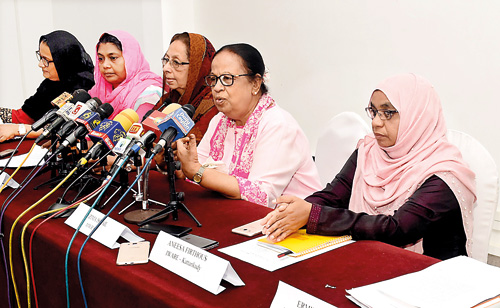News
Muslim women activists insist on urgent reforms in personal law
View(s):Muslim women activists have called on their community’s parliamentarians and religious scholars to act urgently in implementing the reforms needed to make the Muslim personal law (MPL) compatible with “God’s compassion and justice” — and end the suffering of Muslim women and girls.

Muslim personal law reformer Jezima Ismail addressing the news conference . Pic by Priyanka Samaraweera
Addressing a media conference in Colombo on Friday, the activists said they had waited long enough and the time was right now to offer a complete solution aimed at solving the problems Muslim women had been condemned to face because of serious defects in the Muslim Marriage and Divorce Act (MMDA).
While welcoming the Muslim parliamentarians’ assent to amend the controversial law, the activists expressed fears over fresh moves to delay the process after the very same ministers backpedalled and appointed a committee to further study the matter, in the wake of opposition from some Muslim theologians.
The news conference was jointly convened by the Muslim Women’s Development Trust (MWDT) – Puttalam, the Islamic Women’s Association for Research and Empowerment (IWARE) – Batticaloa, the Muslim Personal Law Reform Action Group (MPLRAG) and the Women’s Action Network (WAN) – North & East.
Representing these organisations were veteran Muslim educationist Jezima Ismail, former Minister Ferial Ashraff, lawyers Ermiza Tegal, Safana Gul Begum and activists Juhairiya Mohideen and Aneesa Firthouse.
Ms. Ismail, a forty-year veteran of MPL reforms, said they were only seeking reforms in keeping with Quranic principles of compassion, justice and humanitarian values. “There is an urgent need to eliminate the suffering Sri Lanka’s Muslim women and children are undergoing. We call for reforms which are compatible with the Quranic concept of justice and also in conformity with Sri Lanka’s judicial system, because this is our country. We are not only loyal to our community; we are also loyal to our country,” she said.
Endorsing her views, Ms. Ashraf said that while God’s laws exhorted kindness and justice, man-made laws led to oppression and suffering. “God is deeply compassionate and has no part in oppressive laws,” she said.
Lawyer Ermiza Tegal said the call for reforms was coming from within the Muslim community. “Religions and laws are there for the benefit of the people and for the progress of the people. Therefore, religion and law cannot be oppressive,” she said.
Tracing the history of the MPL in Sri Lanka, she said different versions of the law had existed in the past and they had been amended and repealed. In the same manner, the present Act also should be amended as it was oppressive, discriminatory in nature and had led to oppression and misery, she said.
In a reference to conservative Muslim scholars’ reservations about the reforms, Ms. Tegal said that in Islam there was no priesthood and, therefore, Muslim scholars could only express their views and the people could use their judgment to accept or reject their opinions.
She said what was required was no piecemeal solution but a total solution addressing a gamut of issues the Muslim women and girls face as a result of the inadequacy of the MMDA.
Last week, announcing the Muslim parliamentarians’ decision to push the reforms through parliament, Opposition parliamentarian Faiszer Musthapha told a media conference that the amendments they support included raising the minimum age of marriage for both bride and groom to 18, allowing the bride to sign the marriage register, permitting women to function as Quazis or personal court judges and setting an attorney-at-law certificate as the minimum qualification to become a Quazi.
The main Muslim theologians’ organisation, the All Ceylon Jamiathul Ulama (ACJU), has expressed reservations about some of the reforms. Its president, Mufti Mohamed Rizvi, was a member of a government committee appointed ten years ago to recommend reforms.
In response, the Muslim women groups said in a statement, “MMDA reform cannot be a bargaining game between Muslim MPs and one group of theological scholars with a patriarchal, narrow reading and interpretation of Islamic texts. There are other scholars with wholly different thinking based on alternative interpretations and ground realities.”
Last year, the committee headed by retired Supreme Court judge Saleem Marsoof, released two reports, indicating a split, with the liberals calling for sweeping reforms, while the conservatives led by the ACJU chief preferred a cautious approach.
The Muslim personal law was first enacted during the colonial period. It was based on the law practised in the Indonesian province of Batavia some 200 years ago.
Ms. Ashraf said they did not want to sidestep the ACJU. “We want to adopt a unanimous approach,” she said, pointing out that the ACJU had also agreed that the MMDA needed reforms though there were disagreements.
Attorney-at-Law Safana Gul Begum said the Muslim parliamentarians were pushing for selective reforms, whereas the need was for a complete overhaul. She said they were disturbed by the Muslim MPs’ vacillation. “They should go ahead and pass the amendments, without appointing committees and causing further delays that only add to the suffering of Muslim women,” she said.
Juhairiya Mohideen of the Puttalam-based Muslim women rights group said: “In my area, women are given in marriage without the marriage being registered. Women are not only legally affected; they are also psychologically, emotionally and physically affected,” she said. “We marry someone in the belief that the law will protect us and our family life will be beautiful, but we soon realise that the very law which is supposed to protect us is the biggest problem,” Ms. Mohideen said.
Aneesa Firthouse, whose organisation works for the welfare of the affected women in Batticaloa, said the MMDA’s lacuna was liberally abused by men to perpetuate polygamy, ignoring the restrictions imposed by Islam.
She said the MMDA should be in conformity with the other laws of the country, especially the laws relating to children’s education and welfare.
| Reforms: Key demands by Muslim women groups | |
|

